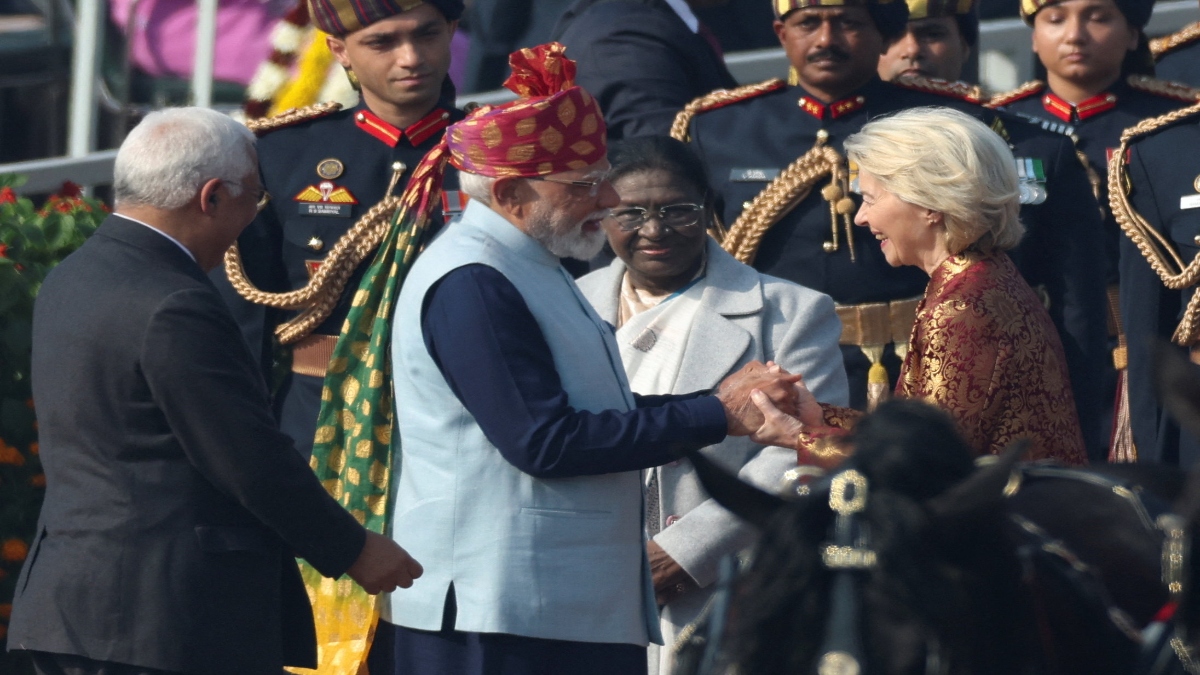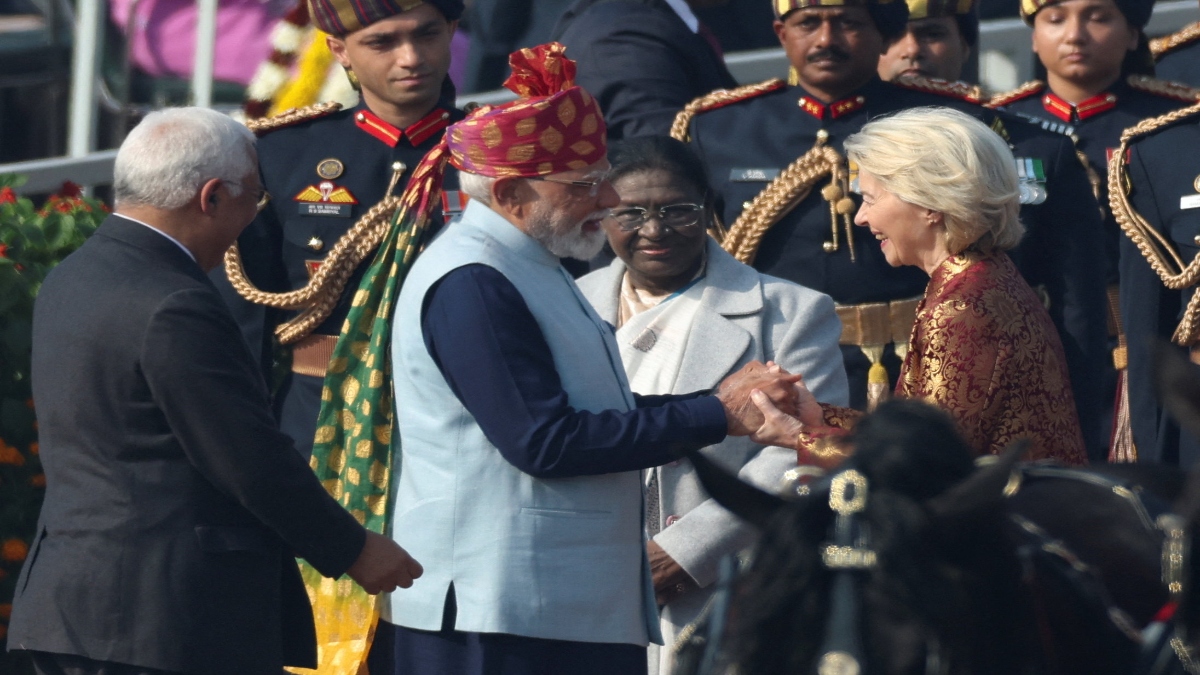Anwaar-ul-Haq Kakar, the caretaker prime minister of Pakistan, announced the formation of a new cabinet on Thursday as he prepares to steer the nation through difficult times until a new administration is established following general elections.
Mushaal Hussein Mullick, the wife of Kashmiri separatist leader Yasin Malik, was one of the faces in the government that attracted attention.
She will serve as the Prime Minister’s Special Assistant on human rights, not as a full-time minister. Special assistants can be dual nationals, however full or deputy ministers must be Pakistanis.
Notably, this is the first time a politician from Pakistani-occupied Kashmir (PoK) has been a part of the federal cabinet.
About Mushaal Hussein Mullick
According to Wion News, Mushaal, an alumnus of the London School of Economics, tied the knot with Yasin Malik, the leader of the Jammu and Kashmir Liberation Front (JKLF), on 22 February 2009, in Rawalpindi.
Some of Pakistan’s top political figures at the time reportedly attended the wedding festivities.
The duo met during one of Malik’s trips to Pakistan in 2005.
Rehana Mullick, Mushaal’s mother, was the secretary general of the women’s section of the Pakistan Muslim League (Nawaz) (PML-N).
Quick Reads
View AllNews18 reported that the first Pakistani to serve on a Nobel Prize jury was Mushaal’s father, MA Hussein, an international economist who oversaw the economics programme at the University of Bonn.
Her brother Haider Ali Hussein Mullick, a foreign policy expert with a base in Washington, DC, currently is a lecturer at the Naval Post Graduate School. While her sister Sabien Hussein Mullick is a social worker.
Mushaal resides with her daughter Raziyah Sultana, 12, in Islamabad, reported Wion News.
Yasin Malik serving a life sentence
Yasin Malik was found guilty on 19 May 2022, by a court in the National Capital in a case involving alleged terrorism and secessionist actions in the Kashmir Valley in 2016–17. He received a life sentence.
Malik entered a plea of guilty to the accusations brought against him. He informed the court that he was not contesting the charges brought against him under sections 120-B (criminal conspiracy) and 124-A (sedition) of the IPC as well as sections 16 of the UAPA (terrorist act), 17 of the UAPA (raising funds for the terrorist act), 18 of the UAPA (conspiracy to commit terrorist act), and 20 of the UAPA (being a member of a terrorist gang or organisation).
In May this year, the National Investigation Agency (NIA) approached the Delhi High Court seeking the death penalty for Malik, who is currently lodged in Tihar jail, as per Hindustan Times.
Malik, who was born in April 1966 in Srinagar’s Maisuma, is also currently facing trial for the 1989 kidnapping of Rubaiya Sayeed, the daughter of the then-Union Home Minister Mufti Mohammad Sayeed, as well as the 1990 JKLF militant attack in Srinagar that resulted in four fatalities and numerous injuries as well as the abduction of IAF personnel.
Interim Pakistan PM Kakar’s 19-member cabinet takes oath
Pakistan’s National Assembly was dissolved on 9 August, ending the tenure of the government led by Shehbaz Sharif and paving the way for installing a caretaker setup.
A 19-member Cabinet of Pakistan’s newly appointed caretaker Prime Minister Anwaar-ul-Haq Kakar took oath on Thursday to run the cash-strapped country until the general elections and ensure a seamless transition of power. President Arif Alvi administered an oath to the caretaker Cabinet at Aiwan-e-Sadr, the presidential house.
According to an official statement, 16 federal ministers and three advisers are part of the Cabinet.
Former foreign secretary Jalil Abbas Jilani has been appointed as Foreign Minister, Sarfaraz Bugti as Interior Minister, Shamshad Akhtar as Finance Minister, Lt Gen (retd) Anwar Ali Haider as Defence Minister and senior journalist Murtaza Solangi as Information Minister.
Khalil George took the oath as Minister for Minorities, industrialist Gohar Ijaz as Minister for Industries, academic Dr Umar Saif as Minister for Information Technology, Ahmad Irfan Aslam as Law Minister, renowned actor Jamal Shal as Minister for Culture, Aniq Ahmad as Religious Affairs Minister.
Akhtar is the only woman in the Cabinet.
The oath-taking ceremony began with the recitation of the Holy Quran at the President’s House in Islamabad.
Pakistan’s constitution mandates a neutral caretaker administration for overseeing national elections, which are expected to take place within 90 days of the dissolution of the lower house of parliament, likely by early November.
But the Election Commission of Pakistan (ECP) on Thursday decided to conduct a fresh delimitation of the constituencies, making it almost certain that general elections may not be held within the stipulated period of 90 days.
Earlier this month, the Council of Common Interests (CCI) approved the results of the 2023 digital census, making it compulsory for the ECP to conduct fresh delimitation, a process that will take nearly four months.
According to a schedule issued by the ECP, the electoral watchdog will complete the delimitation exercise by mid-December.
Pakistan is currently in the throes of an economic crisis.
The Pakistan government and the International Monetary Fund (IMF) reached a long-awaited staff-level agreement on 29 June to inject a US $3 billion Standby Arrangement (SBA) into the ailing economy after months-long negotiations that pushed the country to the brink of default.
With inputs from agencies


)

)
)
)
)
)
)
)
)



